Unit 6 Outdoor fun 复习课件(共38张PPT)
文档属性
| 名称 | Unit 6 Outdoor fun 复习课件(共38张PPT) | 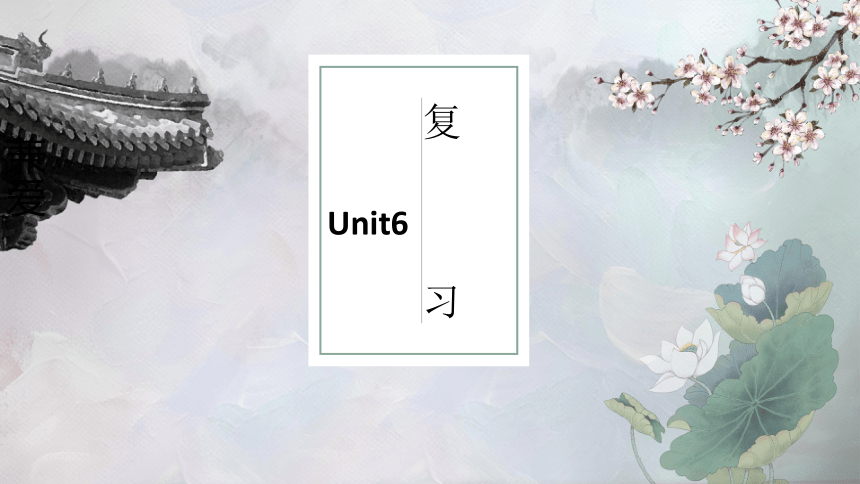 | |
| 格式 | pptx | ||
| 文件大小 | 2.2MB | ||
| 资源类型 | 教案 | ||
| 版本资源 | 牛津译林版 | ||
| 科目 | 英语 | ||
| 更新时间 | 2022-04-08 14:45:38 | ||
图片预览

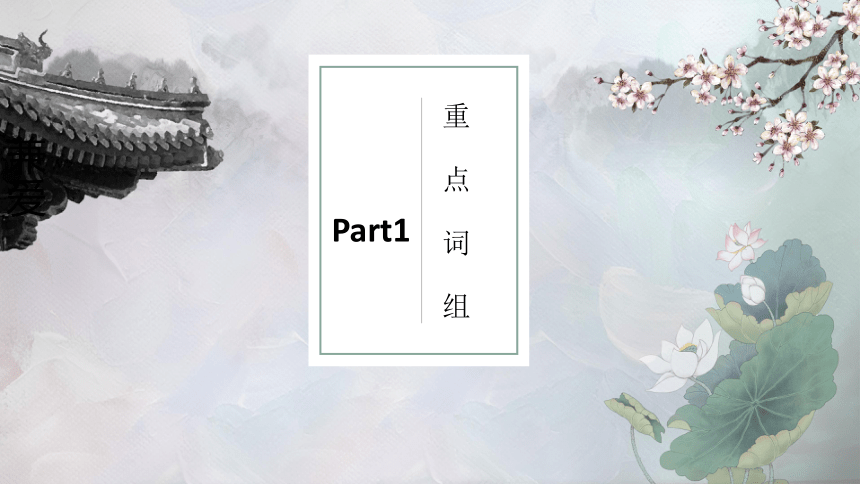
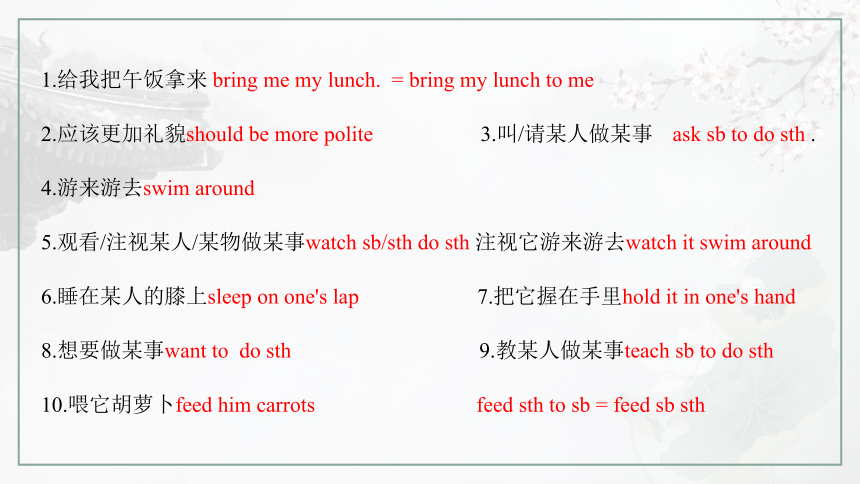
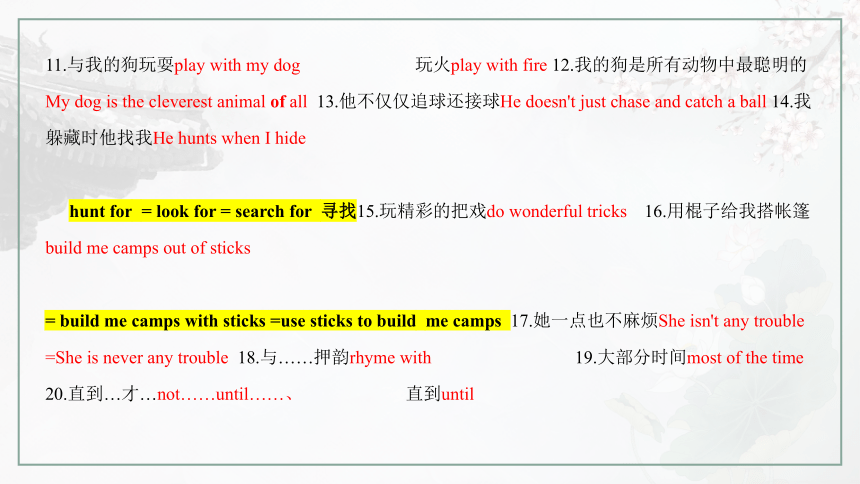

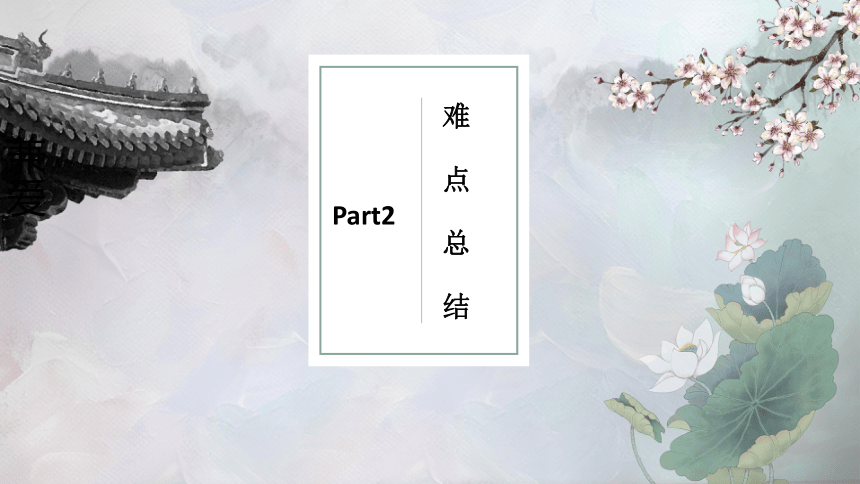
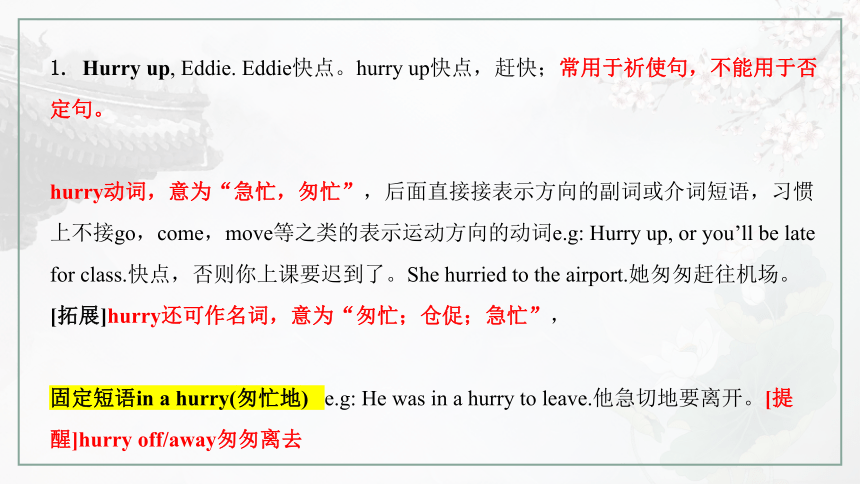

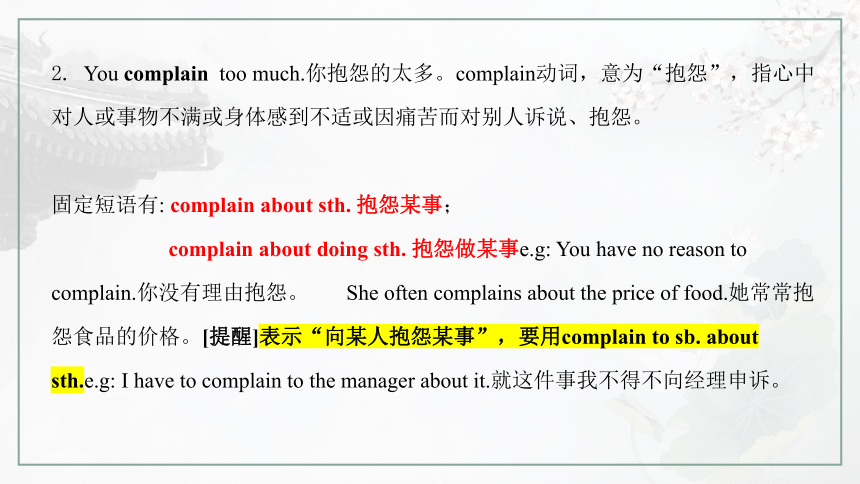
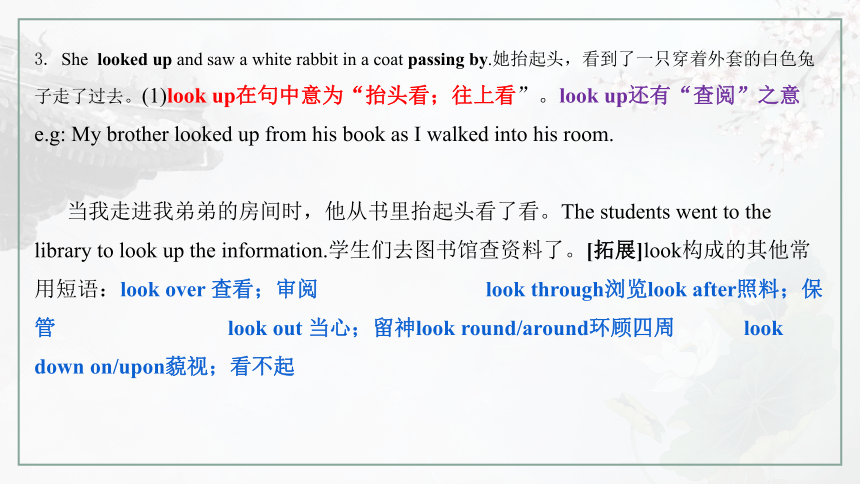
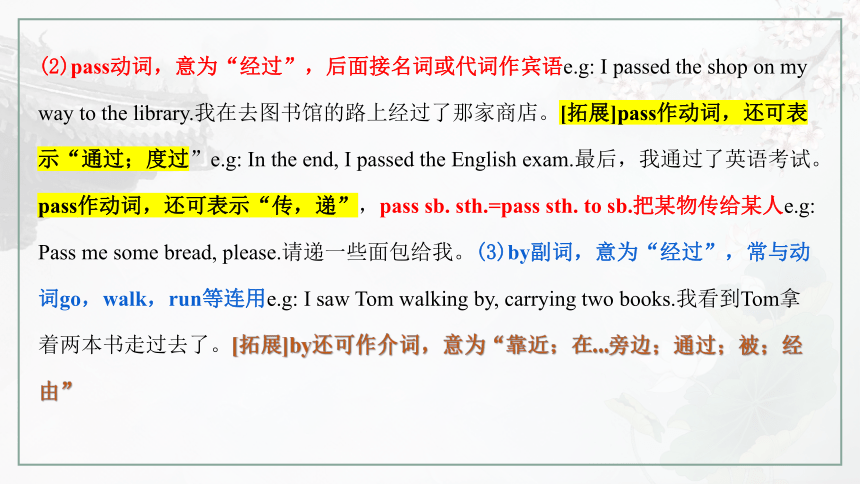

文档简介
(共38张PPT)
兼爱
复习
Unit6
兼爱
重点词组
Part1
1.给我把午饭拿来 bring me my lunch. = bring my lunch to me
2.应该更加礼貌should be more polite 3.叫/请某人做某事 ask sb to do sth . 4.游来游去swim around
5.观看/注视某人/某物做某事watch sb/sth do sth 注视它游来游去watch it swim around 6.睡在某人的膝上sleep on one's lap 7.把它握在手里hold it in one's hand 8.想要做某事want to do sth 9.教某人做某事teach sb to do sth 10.喂它胡萝卜feed him carrots feed sth to sb = feed sb sth
11.与我的狗玩耍play with my dog 玩火play with fire 12.我的狗是所有动物中最聪明的My dog is the cleverest animal of all 13.他不仅仅追球还接球He doesn't just chase and catch a ball 14.我躲藏时他找我He hunts when I hide
hunt for = look for = search for 寻找15.玩精彩的把戏do wonderful tricks 16.用棍子给我搭帐篷build me camps out of sticks
= build me camps with sticks =use sticks to build me camps 17.她一点也不麻烦She isn't any trouble =She is never any trouble 18.与……押韵rhyme with 19.大部分时间most of the time 20.直到…才…not……until……、 直到until
21.按门铃ring the doorbell 22.环顾四周look around 四处找我look around for me
23.电脑有毛病了
There is something wrong with the computer = Something is wrong with the computerWhat's wrong with you 你怎么啦 = What's the trouble/matter with you 24.累了get /be tired 25.向某人问好 say hello to sb 向某人告别say goodbye to sb
26.敲门knock on /at the door
27.属于某人的belong to sb belong to me /Jim
42.……害怕……be afraid of
43.喜欢打架like to fight
44.照料、照顾take care of = look after Take good care of = look after… well
45. 梳理狗毛 brush the dog's fur
兼爱
难点总结
Part2
1. Hurry up, Eddie. Eddie快点。hurry up快点,赶快;常用于祈使句,不能用于否定句。
hurry动词,意为“急忙,匆忙”,后面直接接表示方向的副词或介词短语,习惯上不接go,come,move等之类的表示运动方向的动词e.g: Hurry up, or you’ll be late for class.快点,否则你上课要迟到了。She hurried to the airport.她匆匆赶往机场。[拓展]hurry还可作名词,意为“匆忙;仓促;急忙”,
固定短语in a hurry(匆忙地) e.g: He was in a hurry to leave.他急切地要离开。[提醒]hurry off/away匆匆离去
1.What do you like about camping?
I like being outside,near beautiful lakes and hills。 1) What do you like about…… 指已知对方喜欢某种事物询问起有关该事物某个方面,回答必须是针对事物而不能使用程度副词。 2)What do you think of……?= How do you like……? 用来询问对方对某事物的看法,译成:你觉得……怎么样?
2. You complain too much.你抱怨的太多。complain动词,意为“抱怨”,指心中对人或事物不满或身体感到不适或因痛苦而对别人诉说、抱怨。
固定短语有: complain about sth. 抱怨某事;
complain about doing sth. 抱怨做某事e.g: You have no reason to complain.你没有理由抱怨。 She often complains about the price of food.她常常抱怨食品的价格。[提醒]表示“向某人抱怨某事”,要用complain to sb. about sth.e.g: I have to complain to the manager about it.就这件事我不得不向经理申诉。
3. She looked up and saw a white rabbit in a coat passing by.她抬起头,看到了一只穿着外套的白色兔子走了过去。(1)look up在句中意为“抬头看;往上看”。look up还有“查阅”之意e.g: My brother looked up from his book as I walked into his room.
当我走进我弟弟的房间时,他从书里抬起头看了看。The students went to the library to look up the information.学生们去图书馆查资料了。[拓展]look构成的其他常用短语:look over 查看;审阅 look through浏览look after照料;保管 look out 当心;留神look round/around环顾四周 look down on/upon藐视;看不起
(2)pass动词,意为“经过”,后面接名词或代词作宾语e.g: I passed the shop on my way to the library.我在去图书馆的路上经过了那家商店。[拓展]pass作动词,还可表示“通过;度过”e.g: In the end, I passed the English exam.最后,我通过了英语考试。pass作动词,还可表示“传,递”,pass sb. sth.=pass sth. to sb.把某物传给某人e.g: Pass me some bread, please.请递一些面包给我。(3)by副词,意为“经过”,常与动词go,walk,run等连用e.g: I saw Tom walking by, carrying two books.我看到Tom拿着两本书走过去了。[拓展]by还可作介词,意为“靠近;在...旁边;通过;被;经由”
4. It took a watch out of its pocket and looked at the time.
它从口袋里拿出一只表,看了看时间。take out是固定短语,表示“取出;拔出;除掉”。其中out是副词,名词作宾语放在out前后都可以;但若是代词作宾语须放在take与out之间。若表示“从...取出某物”用介词ofe.g: He opened his schoolbag and took out a notebook/took a notebook out.
他打开书包,拿出了一个笔记本。Your pen is in the box. Please take it out.你的钢笔在盒子里。请取出来。[拓展]take out还表示“把...带出去”e.g: My father is taking me out to go for a drive.我父亲要带我出去兜风。[提醒]out of短语后若无宾语,则应将of省略
5. Alice fell for a long time, and then she hit the ground.Ailce
下落了很长一段时间,然后她撞到了地面。(1)fall动词,意为“落下,掉落;倒下,跌落,”
固定短语有:
fall down掉下,摔下;fall off 掉下,跌落;fall behind落后,跟不上;fall over跌翻,摔倒e.g: Babies often fall when they are learning to walk.婴儿学走路时时常会跌倒。 Please climb down the tree, or you will fall down.请从树上下来,不然你会摔下来的。[拓展]fall作名词,表示“秋天”,相当于英式英语中的autumne.g: Fall is a harvest season.秋天是收获的季节。(2)hit动词,意为“击中,撞”,后面直接接人或物作宾语e.g: Look out! Don’t hit the tree.当心!不要撞在树上。[提醒]在表达“击中”或“打了”某人某个部位时,英语用“主语+谓语+sb.+介词+the+身体部位”结构,常用的介词有on,in。
在脸、肚子等较柔软的部位,用in;在头、鼻子、背等较硬部位,用on
6. She found herself alone in a long, low hall.她发现她独自一人在一个又长又矮的大厅里。(1)find herself alone为固定结构“find+宾语+形容词”,表示“发觉某人/某物处于某种(意外的)状态”;find动词,还可意为“认为,觉得” e.g: I find English very important.我认为英语很重要。[提醒]“find+宾语+介词短语”结构表示“发觉某人/某物(在哪里)” e.g: He woke up and found himself in a hospital bed.他醒来发觉自己躺在医院的床上。[拓展]类似的结构有:“keep/make/think...+宾语+形容词”e.g: We must keep our classroom clean.我们必须保持教室干净。 His words made us happy.他的话让我们很高兴。(2)alone形容词,意为“独自,单独”,习惯上只用作表语,指客观上独自一人,
相当于by oneself或on one's owne.g: Some parents sometimes have to leave their children alone at home.
一些父母有时不得不把孩子一个人留在家里。[拓展]alone作副词,意为“单独;独自”
7. Then Alice noticed a small door and put the key into it.
然后Alice注意到了一个小门,并把钥匙投了进去。(1)notice动词,意为“注意,察觉”,后面直接跟名词或代词作宾语e.g:He was so busy that he didn’t notice me.他太忙了,没有注意到我。[提醒]notice sb. doing sth.注意到某人正在做某事;notice sb. do sth.注意到某人做某事e.g:He noticed a bird singing in the tree.他注意到一只鸟正在树上唱歌。I noticed him enter the office.我注意到他进了办公室。[拓展] see sb. doing sth.看到某人正在做某事;see sb. do sth.看见某人做某事 hear sb. doing sth.听到某人正在做某事;hear sb. do sth听到某人做某事[拓展]notice 还可作名词,意为“通告,通知,布告”,复数为noticese.g:There is a notice on the wall.墙上有一则通告。
8. Alice tried to go through the door, but she was too big.Alice试着穿过这扇门,但是她太大了。through介词,意为“穿过,通过”,强调从某个立体空间内穿越,指穿过隧道、窗户、门、森林等e.g:The dog can’t walk through the hole.这只狗不能从这个洞钻过去。[辨析] through,across,over与past
词条 含义 用法
through 介词,意为“穿过,通过” 强调从某个立体空间内穿越
across 介词,意为“穿过” 强调从某个平面的一边到另一边
over 介词,意为“越过,跨越” 强调从某物的正上面跨越
past 介词,意为“经过,超过” 强调从某物/某人的旁边经过
e.g:You can see through the glass.你可以透过这块玻璃看过去。Walk across the bridge, and you’ll see a tall tree.走过那座桥,你会看见一棵大树。Tom likes jumping over the chair.Tom喜欢从椅子上跳过去。He is walking past the post office.他正从邮局旁边走过。
9. We put up our tent near a lake. 我们把我们的帐篷搭在湖边。put up “挂起,举起”,常用于挂旗子、举手等。宾语是名词时,可放在put与up的中间或后面,但宾语是代词时,一定要放在中间。[拓展]put up 张贴e.g: Please put up these posters on the wall quickly. 请快点把这些海报张贴到墙上。put构成的短语有:put on 穿上put out 扑灭put away 收起来;放好put off 推迟,延期
10. used bamboo to make kites 用竹子来制作风筝use sth. to do sth. 用某物做某事[拓展]used to do sth. 过去常常做某事,
(表示过去经常发生的动作或存在的状态,而现在已不再发生或存在)e.g: They used to be good friends. 他们过去是好朋友。
11. In the ... century, an Italian man called ... visited China. 在……世纪,一位叫做……的意大利人拜访了中国。century (n.)世纪,百年e.g: We are living in the 21st century. 我们生活在21世纪。[拓展]用century表示“几世纪”,要用固定结构“the+序数词+century”,century前需用序数词,并加定冠词the。e.g: the twentieth century 20世纪[提醒]this century或the century指“本世纪”;
last century指“上个世纪”;next century指“下个世纪”。
12. She looked down and saw that her body became smaller and smaller. 她低头看到自己的身体变得越来越小。become(v.)“开始变得,变成”,后接形容词或名词短语作表语。e.g: The sky becomes cloudy. 天空变得多云了。[拓展]类似become的连系动词有:look, feel, get, grow, keep, look, seem, smell, sound, taste, turn等。
13. Soon Alice was small enough to go through the door, so she decided to enter the garden. 很快爱丽丝变得足够小能穿过那扇门,所以她决定进入花园。(1)decide (v.)决定decide to do sth 决定做某事e.g: My home is only 5 minutes’ walk from school. I decide to walk there every day.我家到学校只要步行五分钟。我决定每天步行上学。[提醒]decide to do sth.
否定式为decide not to do sth.,表示“决定不做某事”。
文本研读
(2)enter (v.)“进入,加入”,后面不能接介词
相当于come/go into。e.g: Please enter the house by the back door. 请从后门进屋。[拓展]enter (v.)“参加”,后面可接考试、比赛等。e.g: He is going to enter the drawing competition.
他将要去参加绘画比赛。[提醒]enter的名词为entrance,意为“进入,入口处”
the entrance to ...表示“……的入口处”。
文本研读
13. When she walked towards the door, she forgot about the key. 当她走向门的时候,她忘了钥匙这件事情。(1)towards (prep.)“向,朝”,还可写成toward,强调方向性,常与动词连用,后接名词或代词。e.g: The sunflower turns toward(s) the Sun. 向日葵朝向太阳。[辨析]towards与to
词条 含义 用法
towards 介词,意为“向,朝” 只表示“方向”,不含到达某地之意,表示向某处移动
to 介词,意为“向,朝;面对” 强调移动的目的地,往往带有“已到达某地”的意思
文本研读
(2)用法forget about表示“忘记;遗忘”,其中about可省略。forget后跟名词、代词、动词不定式、动名词或从句作宾语。e.g: I almost forgot my umbrella.我差一点就忘了我的雨伞。[注意]①forget to do sth.表示“忘记去做某事(事情还未做)”e.g: Don’t forget to close the window when you leave the room.
离开房间时不要忘了关窗户。②forget doing sth. 表示“忘记了做过某事(事情已经做完)”e.g: I forgot telling him about it. 我忘记了曾经告诉过他这件事。
14. Alice had to go back to the table, but she was too small to reach the key. 爱丽丝不得不回到桌子边,但是她太小了以至于够不到钥匙。(1)too ... to ...太……而不能……,too后面接形容词原形;to是动词不定式符号。e.g: My son is too young to join the army. 我儿子太小不能参军。 [拓展]too...to...可与“形容词+enough to do sth.”转换使用。e.g: The boy is too young to go to school.=The boy is not old enough to go to school. 这男孩太小了,不能上学。
(2)reach(v.)“伸手(脚)够到”,后面直接跟宾语。e.g: The apples on the tree are red and big, but I can’t reach them.
树上的苹果又红又大,但我够不到。[拓展]reach (v.)“到达”,后面直接跟宾语,
相当于get to或arrive at/in。e.g: Mr and Mrs Black will reach Shanghai tomorrow afternoon.
布莱克夫妇将于明天下午到达上海。
15. She tried to climb up, but failed. 她试图爬起来,但是失败了。(1)climb (v.)“爬,攀登”,后面直接跟宾语,
也常与up, down, into, to, over等介词连用。e.g: All cats like climbing up trees. 所有的猫都喜欢爬树。[拓展]与climb有关的常用短语有:climb (up) the tree 爬(上)树climb (down) the hill 爬(下)山climb the ladder 爬梯子
(2)fail“失败”,通常强调做了,但是没有成功。固定短语: fail in sth. 在某事上失败了 fail to do sth. 做某事失败了反义词:succeed(成功)succeed in doing sth . 成功做某事e.g: He wanted to run away but failed. 他想逃跑,但失败了。
兼爱
语法总结
Part3
一般过去时行为动词一般过去时的各种句型结构:
句型形式 句型结构
肯定句 主语+动词的过去式+其他
否定句 主语+didn’t+动词原形+其他。
(其中didn’t=did not,did是do的过去式,为助动词。)
疑问句 一般疑问句 Did+主语+动词原形+其他?
肯定回答:Yes,主语+did.否定回答:No,主语+did+not.
特殊疑问句 特殊疑问词+一般疑问句?
兼爱
课堂检测
Part 4
1.________________park she is drawing! A.What a beautiful B。How a beautiful C.What beautiful D.How beautiful 2.Mike works very hard.(改为感叹句) What__________ __________girl Millie is! 3.The policeman helped the old woman_______the road.A.above B.across C.through D。over 4。———Can a plane fly______the Atlantic Ocean -Yes,but it needs to go ______the clouds for hours。 A。across;through B.through;across C。across;across D。through; through
1.________________park she is drawing! A.What a beautiful B。How a beautiful C.What beautiful D.How beautiful 2.Mike works very hard.(改为感叹句) What__________ __________girl Millie is! 3.The policeman helped the old woman_______the road.A.above B.cross C.through D over 4。—Can a plane fly______the Atlantic Ocean -Yes,but it needs to go ______the clouds for hours。 A。across;through B.through;across C。across;across D。through; through
a hard-working
1.Teachers always tell me ______computer games too much。A. not to play B.to play C.not play D。play2.I saw Li Ming______near the river on my way home.A.plays B。playing C。to play D。played。3.Bruce often asks me_______him to play the guitar。A.teach B. to teach C。taught D.teaches4.Danny did all kinds of things to make the baby______. A.to stop crying B.stop crying C。to stop to cry D。stop to cry
1.Teachers always tell me ______computer games too much。A. not to play B.to play C.not play D。play2.I saw Li Ming______near the river on my way home.A.plays B.playing C。to play D。played。3.Bruce often asks me_______him to play the guitar。A.teach B. to teach C。taught D.teaches4.Danny did all kinds of things to make the baby______. A.to stop crying B.stop crying C。to stop to cry D。stop to cry
1.Don’t worry.He is _______to look after little Betty. A.carefully enough B.enough careful C.careful enough D.enough carefully 2.The box is too heavy for him to carry. The box isn’t____________ ______________from him to carry。 3.The children decide_______their school yard this Friday afternoon。 A.clean B.to clean C.cleaning D.cleaned 4.Hearing the bell,the pupils _________ the classroom。 A.came B.stepped C.entered D.entered into
1.Don’t worry.He is _______to look after little Betty. A.carefully enough B.enough careful C.careful enough D.enough carefully 2.The box is too heavy for him to carry. The box isn’t____________ ______________from him to carry。 3.The children decide_______their school yard this Friday afternoon。 A.clean B.to clean C.cleaning D.cleaned 4.Hearing the bell,the pupils _________ the classroom。 A.came B.stepped C.entered D.entered into
light enough
兼爱
Thank you!
兼爱
复习
Unit6
兼爱
重点词组
Part1
1.给我把午饭拿来 bring me my lunch. = bring my lunch to me
2.应该更加礼貌should be more polite 3.叫/请某人做某事 ask sb to do sth . 4.游来游去swim around
5.观看/注视某人/某物做某事watch sb/sth do sth 注视它游来游去watch it swim around 6.睡在某人的膝上sleep on one's lap 7.把它握在手里hold it in one's hand 8.想要做某事want to do sth 9.教某人做某事teach sb to do sth 10.喂它胡萝卜feed him carrots feed sth to sb = feed sb sth
11.与我的狗玩耍play with my dog 玩火play with fire 12.我的狗是所有动物中最聪明的My dog is the cleverest animal of all 13.他不仅仅追球还接球He doesn't just chase and catch a ball 14.我躲藏时他找我He hunts when I hide
hunt for = look for = search for 寻找15.玩精彩的把戏do wonderful tricks 16.用棍子给我搭帐篷build me camps out of sticks
= build me camps with sticks =use sticks to build me camps 17.她一点也不麻烦She isn't any trouble =She is never any trouble 18.与……押韵rhyme with 19.大部分时间most of the time 20.直到…才…not……until……、 直到until
21.按门铃ring the doorbell 22.环顾四周look around 四处找我look around for me
23.电脑有毛病了
There is something wrong with the computer = Something is wrong with the computerWhat's wrong with you 你怎么啦 = What's the trouble/matter with you 24.累了get /be tired 25.向某人问好 say hello to sb 向某人告别say goodbye to sb
26.敲门knock on /at the door
27.属于某人的belong to sb belong to me /Jim
42.……害怕……be afraid of
43.喜欢打架like to fight
44.照料、照顾take care of = look after Take good care of = look after… well
45. 梳理狗毛 brush the dog's fur
兼爱
难点总结
Part2
1. Hurry up, Eddie. Eddie快点。hurry up快点,赶快;常用于祈使句,不能用于否定句。
hurry动词,意为“急忙,匆忙”,后面直接接表示方向的副词或介词短语,习惯上不接go,come,move等之类的表示运动方向的动词e.g: Hurry up, or you’ll be late for class.快点,否则你上课要迟到了。She hurried to the airport.她匆匆赶往机场。[拓展]hurry还可作名词,意为“匆忙;仓促;急忙”,
固定短语in a hurry(匆忙地) e.g: He was in a hurry to leave.他急切地要离开。[提醒]hurry off/away匆匆离去
1.What do you like about camping?
I like being outside,near beautiful lakes and hills。 1) What do you like about…… 指已知对方喜欢某种事物询问起有关该事物某个方面,回答必须是针对事物而不能使用程度副词。 2)What do you think of……?= How do you like……? 用来询问对方对某事物的看法,译成:你觉得……怎么样?
2. You complain too much.你抱怨的太多。complain动词,意为“抱怨”,指心中对人或事物不满或身体感到不适或因痛苦而对别人诉说、抱怨。
固定短语有: complain about sth. 抱怨某事;
complain about doing sth. 抱怨做某事e.g: You have no reason to complain.你没有理由抱怨。 She often complains about the price of food.她常常抱怨食品的价格。[提醒]表示“向某人抱怨某事”,要用complain to sb. about sth.e.g: I have to complain to the manager about it.就这件事我不得不向经理申诉。
3. She looked up and saw a white rabbit in a coat passing by.她抬起头,看到了一只穿着外套的白色兔子走了过去。(1)look up在句中意为“抬头看;往上看”。look up还有“查阅”之意e.g: My brother looked up from his book as I walked into his room.
当我走进我弟弟的房间时,他从书里抬起头看了看。The students went to the library to look up the information.学生们去图书馆查资料了。[拓展]look构成的其他常用短语:look over 查看;审阅 look through浏览look after照料;保管 look out 当心;留神look round/around环顾四周 look down on/upon藐视;看不起
(2)pass动词,意为“经过”,后面接名词或代词作宾语e.g: I passed the shop on my way to the library.我在去图书馆的路上经过了那家商店。[拓展]pass作动词,还可表示“通过;度过”e.g: In the end, I passed the English exam.最后,我通过了英语考试。pass作动词,还可表示“传,递”,pass sb. sth.=pass sth. to sb.把某物传给某人e.g: Pass me some bread, please.请递一些面包给我。(3)by副词,意为“经过”,常与动词go,walk,run等连用e.g: I saw Tom walking by, carrying two books.我看到Tom拿着两本书走过去了。[拓展]by还可作介词,意为“靠近;在...旁边;通过;被;经由”
4. It took a watch out of its pocket and looked at the time.
它从口袋里拿出一只表,看了看时间。take out是固定短语,表示“取出;拔出;除掉”。其中out是副词,名词作宾语放在out前后都可以;但若是代词作宾语须放在take与out之间。若表示“从...取出某物”用介词ofe.g: He opened his schoolbag and took out a notebook/took a notebook out.
他打开书包,拿出了一个笔记本。Your pen is in the box. Please take it out.你的钢笔在盒子里。请取出来。[拓展]take out还表示“把...带出去”e.g: My father is taking me out to go for a drive.我父亲要带我出去兜风。[提醒]out of短语后若无宾语,则应将of省略
5. Alice fell for a long time, and then she hit the ground.Ailce
下落了很长一段时间,然后她撞到了地面。(1)fall动词,意为“落下,掉落;倒下,跌落,”
固定短语有:
fall down掉下,摔下;fall off 掉下,跌落;fall behind落后,跟不上;fall over跌翻,摔倒e.g: Babies often fall when they are learning to walk.婴儿学走路时时常会跌倒。 Please climb down the tree, or you will fall down.请从树上下来,不然你会摔下来的。[拓展]fall作名词,表示“秋天”,相当于英式英语中的autumne.g: Fall is a harvest season.秋天是收获的季节。(2)hit动词,意为“击中,撞”,后面直接接人或物作宾语e.g: Look out! Don’t hit the tree.当心!不要撞在树上。[提醒]在表达“击中”或“打了”某人某个部位时,英语用“主语+谓语+sb.+介词+the+身体部位”结构,常用的介词有on,in。
在脸、肚子等较柔软的部位,用in;在头、鼻子、背等较硬部位,用on
6. She found herself alone in a long, low hall.她发现她独自一人在一个又长又矮的大厅里。(1)find herself alone为固定结构“find+宾语+形容词”,表示“发觉某人/某物处于某种(意外的)状态”;find动词,还可意为“认为,觉得” e.g: I find English very important.我认为英语很重要。[提醒]“find+宾语+介词短语”结构表示“发觉某人/某物(在哪里)” e.g: He woke up and found himself in a hospital bed.他醒来发觉自己躺在医院的床上。[拓展]类似的结构有:“keep/make/think...+宾语+形容词”e.g: We must keep our classroom clean.我们必须保持教室干净。 His words made us happy.他的话让我们很高兴。(2)alone形容词,意为“独自,单独”,习惯上只用作表语,指客观上独自一人,
相当于by oneself或on one's owne.g: Some parents sometimes have to leave their children alone at home.
一些父母有时不得不把孩子一个人留在家里。[拓展]alone作副词,意为“单独;独自”
7. Then Alice noticed a small door and put the key into it.
然后Alice注意到了一个小门,并把钥匙投了进去。(1)notice动词,意为“注意,察觉”,后面直接跟名词或代词作宾语e.g:He was so busy that he didn’t notice me.他太忙了,没有注意到我。[提醒]notice sb. doing sth.注意到某人正在做某事;notice sb. do sth.注意到某人做某事e.g:He noticed a bird singing in the tree.他注意到一只鸟正在树上唱歌。I noticed him enter the office.我注意到他进了办公室。[拓展] see sb. doing sth.看到某人正在做某事;see sb. do sth.看见某人做某事 hear sb. doing sth.听到某人正在做某事;hear sb. do sth听到某人做某事[拓展]notice 还可作名词,意为“通告,通知,布告”,复数为noticese.g:There is a notice on the wall.墙上有一则通告。
8. Alice tried to go through the door, but she was too big.Alice试着穿过这扇门,但是她太大了。through介词,意为“穿过,通过”,强调从某个立体空间内穿越,指穿过隧道、窗户、门、森林等e.g:The dog can’t walk through the hole.这只狗不能从这个洞钻过去。[辨析] through,across,over与past
词条 含义 用法
through 介词,意为“穿过,通过” 强调从某个立体空间内穿越
across 介词,意为“穿过” 强调从某个平面的一边到另一边
over 介词,意为“越过,跨越” 强调从某物的正上面跨越
past 介词,意为“经过,超过” 强调从某物/某人的旁边经过
e.g:You can see through the glass.你可以透过这块玻璃看过去。Walk across the bridge, and you’ll see a tall tree.走过那座桥,你会看见一棵大树。Tom likes jumping over the chair.Tom喜欢从椅子上跳过去。He is walking past the post office.他正从邮局旁边走过。
9. We put up our tent near a lake. 我们把我们的帐篷搭在湖边。put up “挂起,举起”,常用于挂旗子、举手等。宾语是名词时,可放在put与up的中间或后面,但宾语是代词时,一定要放在中间。[拓展]put up 张贴e.g: Please put up these posters on the wall quickly. 请快点把这些海报张贴到墙上。put构成的短语有:put on 穿上put out 扑灭put away 收起来;放好put off 推迟,延期
10. used bamboo to make kites 用竹子来制作风筝use sth. to do sth. 用某物做某事[拓展]used to do sth. 过去常常做某事,
(表示过去经常发生的动作或存在的状态,而现在已不再发生或存在)e.g: They used to be good friends. 他们过去是好朋友。
11. In the ... century, an Italian man called ... visited China. 在……世纪,一位叫做……的意大利人拜访了中国。century (n.)世纪,百年e.g: We are living in the 21st century. 我们生活在21世纪。[拓展]用century表示“几世纪”,要用固定结构“the+序数词+century”,century前需用序数词,并加定冠词the。e.g: the twentieth century 20世纪[提醒]this century或the century指“本世纪”;
last century指“上个世纪”;next century指“下个世纪”。
12. She looked down and saw that her body became smaller and smaller. 她低头看到自己的身体变得越来越小。become(v.)“开始变得,变成”,后接形容词或名词短语作表语。e.g: The sky becomes cloudy. 天空变得多云了。[拓展]类似become的连系动词有:look, feel, get, grow, keep, look, seem, smell, sound, taste, turn等。
13. Soon Alice was small enough to go through the door, so she decided to enter the garden. 很快爱丽丝变得足够小能穿过那扇门,所以她决定进入花园。(1)decide (v.)决定decide to do sth 决定做某事e.g: My home is only 5 minutes’ walk from school. I decide to walk there every day.我家到学校只要步行五分钟。我决定每天步行上学。[提醒]decide to do sth.
否定式为decide not to do sth.,表示“决定不做某事”。
文本研读
(2)enter (v.)“进入,加入”,后面不能接介词
相当于come/go into。e.g: Please enter the house by the back door. 请从后门进屋。[拓展]enter (v.)“参加”,后面可接考试、比赛等。e.g: He is going to enter the drawing competition.
他将要去参加绘画比赛。[提醒]enter的名词为entrance,意为“进入,入口处”
the entrance to ...表示“……的入口处”。
文本研读
13. When she walked towards the door, she forgot about the key. 当她走向门的时候,她忘了钥匙这件事情。(1)towards (prep.)“向,朝”,还可写成toward,强调方向性,常与动词连用,后接名词或代词。e.g: The sunflower turns toward(s) the Sun. 向日葵朝向太阳。[辨析]towards与to
词条 含义 用法
towards 介词,意为“向,朝” 只表示“方向”,不含到达某地之意,表示向某处移动
to 介词,意为“向,朝;面对” 强调移动的目的地,往往带有“已到达某地”的意思
文本研读
(2)用法forget about表示“忘记;遗忘”,其中about可省略。forget后跟名词、代词、动词不定式、动名词或从句作宾语。e.g: I almost forgot my umbrella.我差一点就忘了我的雨伞。[注意]①forget to do sth.表示“忘记去做某事(事情还未做)”e.g: Don’t forget to close the window when you leave the room.
离开房间时不要忘了关窗户。②forget doing sth. 表示“忘记了做过某事(事情已经做完)”e.g: I forgot telling him about it. 我忘记了曾经告诉过他这件事。
14. Alice had to go back to the table, but she was too small to reach the key. 爱丽丝不得不回到桌子边,但是她太小了以至于够不到钥匙。(1)too ... to ...太……而不能……,too后面接形容词原形;to是动词不定式符号。e.g: My son is too young to join the army. 我儿子太小不能参军。 [拓展]too...to...可与“形容词+enough to do sth.”转换使用。e.g: The boy is too young to go to school.=The boy is not old enough to go to school. 这男孩太小了,不能上学。
(2)reach(v.)“伸手(脚)够到”,后面直接跟宾语。e.g: The apples on the tree are red and big, but I can’t reach them.
树上的苹果又红又大,但我够不到。[拓展]reach (v.)“到达”,后面直接跟宾语,
相当于get to或arrive at/in。e.g: Mr and Mrs Black will reach Shanghai tomorrow afternoon.
布莱克夫妇将于明天下午到达上海。
15. She tried to climb up, but failed. 她试图爬起来,但是失败了。(1)climb (v.)“爬,攀登”,后面直接跟宾语,
也常与up, down, into, to, over等介词连用。e.g: All cats like climbing up trees. 所有的猫都喜欢爬树。[拓展]与climb有关的常用短语有:climb (up) the tree 爬(上)树climb (down) the hill 爬(下)山climb the ladder 爬梯子
(2)fail“失败”,通常强调做了,但是没有成功。固定短语: fail in sth. 在某事上失败了 fail to do sth. 做某事失败了反义词:succeed(成功)succeed in doing sth . 成功做某事e.g: He wanted to run away but failed. 他想逃跑,但失败了。
兼爱
语法总结
Part3
一般过去时行为动词一般过去时的各种句型结构:
句型形式 句型结构
肯定句 主语+动词的过去式+其他
否定句 主语+didn’t+动词原形+其他。
(其中didn’t=did not,did是do的过去式,为助动词。)
疑问句 一般疑问句 Did+主语+动词原形+其他?
肯定回答:Yes,主语+did.否定回答:No,主语+did+not.
特殊疑问句 特殊疑问词+一般疑问句?
兼爱
课堂检测
Part 4
1.________________park she is drawing! A.What a beautiful B。How a beautiful C.What beautiful D.How beautiful 2.Mike works very hard.(改为感叹句) What__________ __________girl Millie is! 3.The policeman helped the old woman_______the road.A.above B.across C.through D。over 4。———Can a plane fly______the Atlantic Ocean -Yes,but it needs to go ______the clouds for hours。 A。across;through B.through;across C。across;across D。through; through
1.________________park she is drawing! A.What a beautiful B。How a beautiful C.What beautiful D.How beautiful 2.Mike works very hard.(改为感叹句) What__________ __________girl Millie is! 3.The policeman helped the old woman_______the road.A.above B.cross C.through D over 4。—Can a plane fly______the Atlantic Ocean -Yes,but it needs to go ______the clouds for hours。 A。across;through B.through;across C。across;across D。through; through
a hard-working
1.Teachers always tell me ______computer games too much。A. not to play B.to play C.not play D。play2.I saw Li Ming______near the river on my way home.A.plays B。playing C。to play D。played。3.Bruce often asks me_______him to play the guitar。A.teach B. to teach C。taught D.teaches4.Danny did all kinds of things to make the baby______. A.to stop crying B.stop crying C。to stop to cry D。stop to cry
1.Teachers always tell me ______computer games too much。A. not to play B.to play C.not play D。play2.I saw Li Ming______near the river on my way home.A.plays B.playing C。to play D。played。3.Bruce often asks me_______him to play the guitar。A.teach B. to teach C。taught D.teaches4.Danny did all kinds of things to make the baby______. A.to stop crying B.stop crying C。to stop to cry D。stop to cry
1.Don’t worry.He is _______to look after little Betty. A.carefully enough B.enough careful C.careful enough D.enough carefully 2.The box is too heavy for him to carry. The box isn’t____________ ______________from him to carry。 3.The children decide_______their school yard this Friday afternoon。 A.clean B.to clean C.cleaning D.cleaned 4.Hearing the bell,the pupils _________ the classroom。 A.came B.stepped C.entered D.entered into
1.Don’t worry.He is _______to look after little Betty. A.carefully enough B.enough careful C.careful enough D.enough carefully 2.The box is too heavy for him to carry. The box isn’t____________ ______________from him to carry。 3.The children decide_______their school yard this Friday afternoon。 A.clean B.to clean C.cleaning D.cleaned 4.Hearing the bell,the pupils _________ the classroom。 A.came B.stepped C.entered D.entered into
light enough
兼爱
Thank you!
